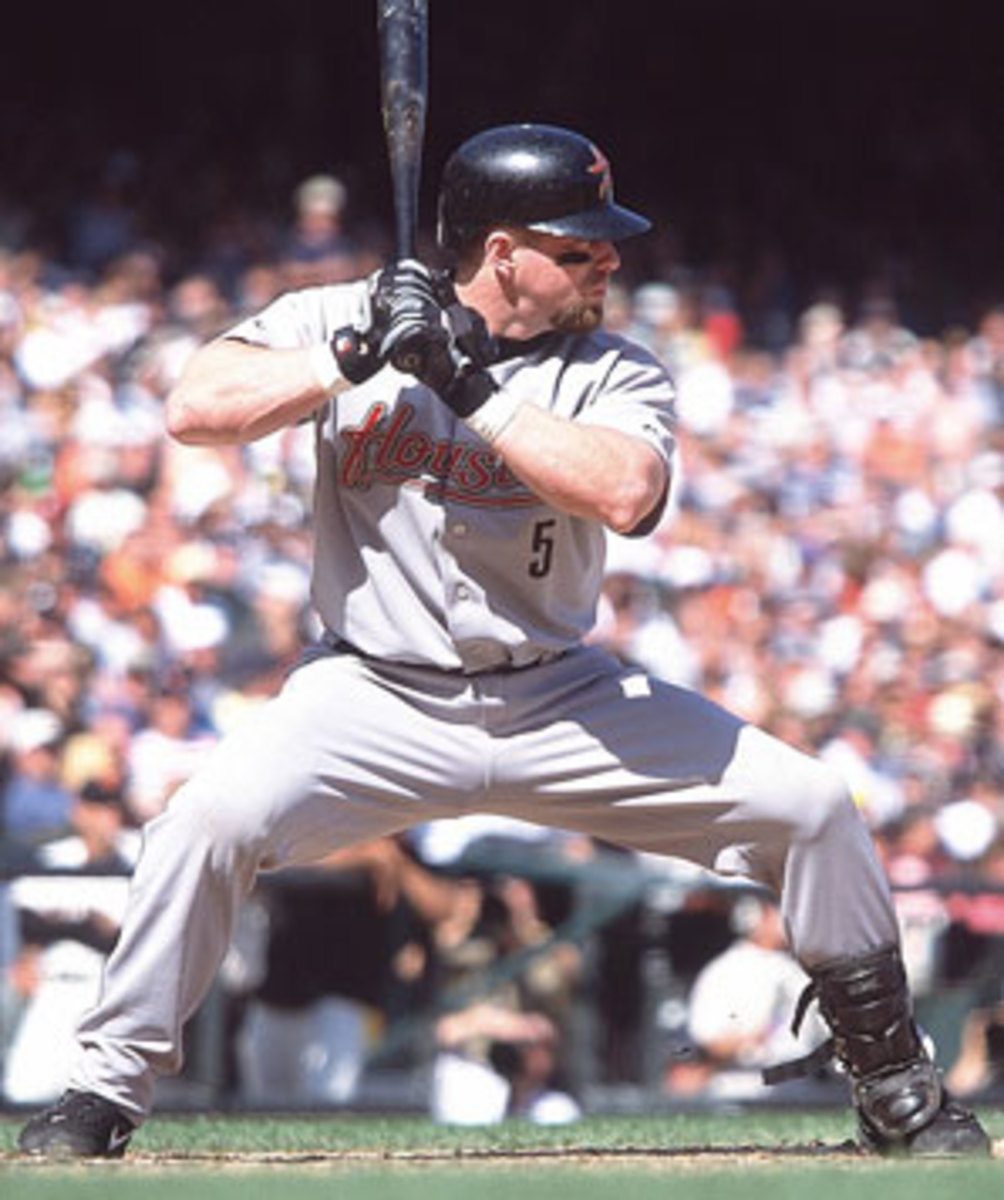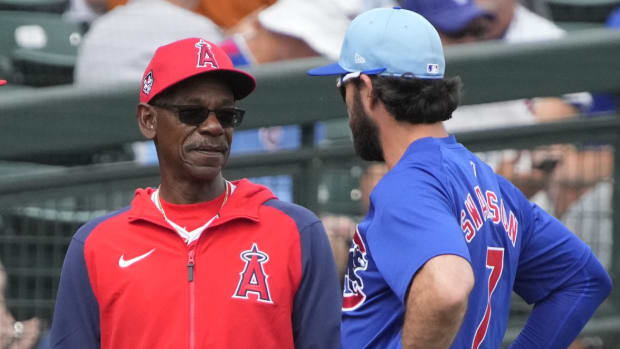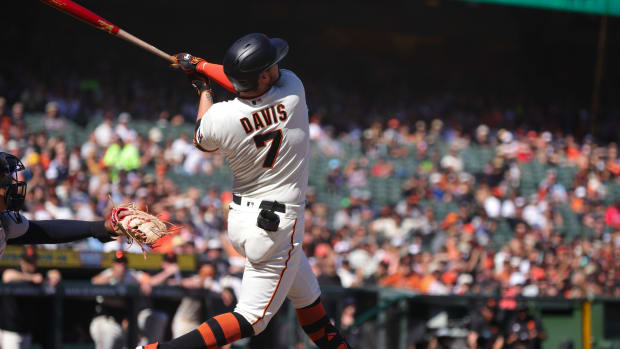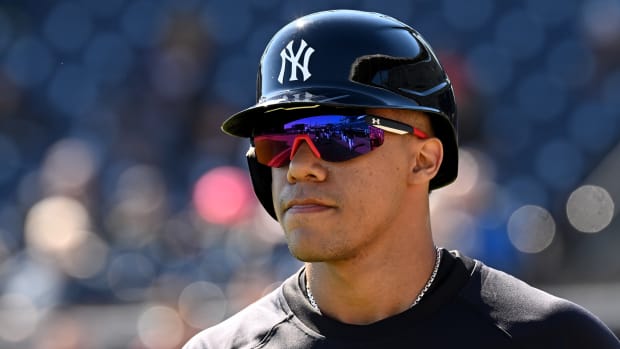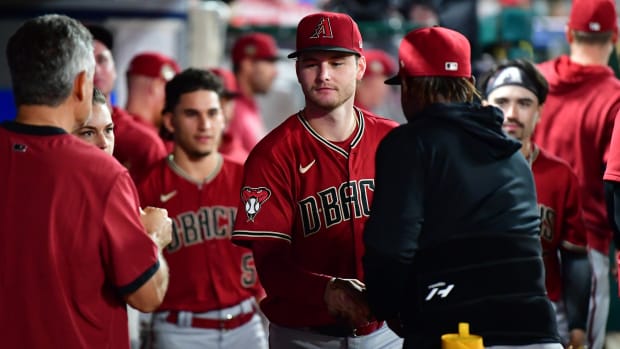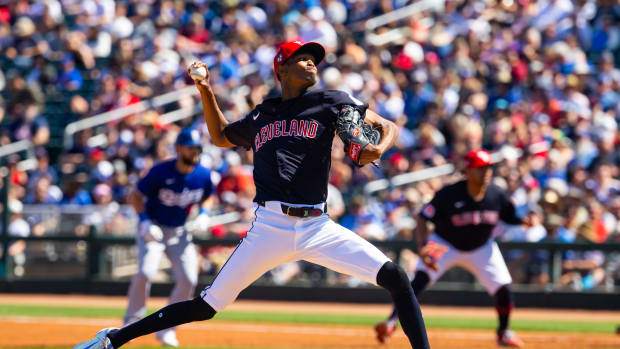JAWS and the 2013 Hall of Fame ballot: Jeff Bagwell
Voters are taking a variety of stances on Jeff Bagwell's career. (Brad Mangin/SI)
The following article is part of my ongoing look at the candidates on the BBWAA 2013 Hall of Fame ballot. For a detailed introduction to JAWS, please see here.
If Craig Biggio is the safe candidate on the 2013 Hall of Fame ballot, Jeff Bagwell, his longtime Astros teammate, is one of the most controversial holdovers. Bagwell's case-in-a-nutshell is strong: an outstanding, durable slugger with power, patience, positive defensive value and an inimitable spread-legged stance, he ranked as one of the best hitters of his era, though he wasn't as flashy as the men who broke the single-season home run record. While his early demise as a player due to shoulder woes left his key counting stats on the lower side relative to the other heavy hitters of the era, his rate stats were phenomenal, and he won NL Rookie of the Year and MVP awards while spending his entire career with one team.
Yet when Bagwell first came up for election on the 2011 ballot, he received just 41.7 percent of the vote, mainly due to a whisper campaign that alleged he had used illegal performance-enhancing drugs in his career. Never mind that he had never tested positive for a banned substance, and hadn't been mentioned in the Mitchell Report. For some voters, mere suspicion that he had used was enough.
As the propriety of not voting for Bagwell was debated that first time around, what many a voter or interested bystander failed to note — critics and supporters alike (this scribe included) — was that he had admitted to using androstenedione long before it was outlawed by Major League Baseball in mid-2004. In the August 31, 1998 issue of Sports Illustrated, Jack McCallum noted that Bagwell "told The Houston Chronicle, two weeks before the McGwire storm erupted, that he had taken it."
'It' was andro and the storm was the one that AP reporter Steve Wilstein unleashed when he detailed the presence of the still-legal substance in Mark McGwire's locker in 1998, when he was chasing Roger Maris' single-season home run record. A year later in SI, Tom Verducci profiled Bagwell, writing, "His off-season regimen now includes not only [competitive bodybuilder Herschel] Johnson's training but also creatine, the nutritional supplement, and the controversial testosterone-boosting androstenedione. 'It may help your workout, but it doesn't help you hit home runs,' he says."
Even with that revelation in the mix, Bagwell's share of the vote rose to 56 percent in 2012, a significant gain beyond the obvious increase in support. Aside from Gil Hodges and the three candidates who surpassed 50 percent on last year's ballot (Jack Morris and Lee Smith being the others), no candidate named by a simple majority of BBWAA voters has failed to gain eventual election to the Hall of Fame, either via the BBWAA or one of the many iterations of the Veterans Committee. Bagwell may not gain entry in 2013, but he would appear to be on his way.
Player | Career | Peak | JAWS | G | H | HR | SB | BA | OBP | SLG | TAv |
Jeff Bagwell | 76.7 | 46.7 | 61.7 | 2150 | 2314 | 449 | 202 | .297 | .408 | .540 | .321 |
Avg HOF 1B | 62.3 | 40.7 | 51.5 |
Born in Boston and drafted by the Red Sox in the fourth round in 1989 out of the University of Hartford, Bagwell never played an inning for his hometown team. Instead, he was traded to the Astros in a 1990 deal for reliever Larry Andersen that has since become a cautionary tale. Andersen gave Boston all of 1.2 WAR via 22 stretch-drive innings, and while Boston would eventually come up with Mo Vaughn to occupy first base, their 86-year championship drought might have been shortened had general manager Lou Gorman not traded Bagwell. Talk about a groundball through the legs.
Bagwell took up residence as Houston's first baseman on Opening Day of the following season, and hit .294/.387/.437 with 15 homers and 4.5 WAR, exceptional numbers for a hitter spending half his time in the Astrodome, which in its day was one of the majors' toughest hitting environments. Bagwell spent his first nine seasons (1991-1999) in the 'Dome, but remarkably enough showed virtually identical home/road slash lines (.303/.421/.546 in Houston, .305/.412/.544 elsewhere). His .331 True Average — expressing his total productivity per plate appearance on a batting average scale after adjusting for park and league scoring environments — ranked fifth during that span behind Barry Bonds, Frank Thomas, Mark McGwire and Mike Piazza, and his 55.0 WAR was third behind Bonds and Ken Griffey Jr.
Stuck in the same league as both Bonds and McGwire, Bagwell never led the NL in homers, but he did rank second in 1994 (39) and 1997 (43), the latter one of three 40-homer seasons he had in a four-year span. He ranked among the top 15 in True Average in every year from 1991-1999, and the top five six times in the latter seven of those years, leading the league both in 1994 (.393) and 1999 (.347). His strike-shortened 1994 numbers are off the charts: .368/.451/.750 with 39 homers in 110 games, for a career-high 7.9 WAR, 1.9 higher than Bonds and 2.9 higher than any other NL position player.
The Astros were a doormat when Bagwell joined them, but with an offense led by him and fellow "Killer B" Biggio, they soon emerged as contenders. Division realignment was kind to them; they finished first in the new NL Central four times in a five-year span from 1997-2001, though each time they lost in the first round, and in fact went 2-12 in the postseason during that span. Bagwell was of particularly little help in those series, batting just .174/.367/.174.
The move to Enron Field (later Minute Maid Park) came in 2000, when Bagwell was 32, and the hitter-friendly park helped mask his gentle decline. He was still worth an average of 4.3 WAR from 2000-2004, but his True Averages fell by about 25 points. His play took a noticeable dip in 2004, when he hit just .266/.377/.465, the first time he'd slugged below .500 since 1995, but he did hit .286/.375/.490 in the postseason as the Astros fell one win short of the World Series.
Houston would get there the next year, but Bagwell made just 123 plate appearances in 2005 due to an arthritic right shoulder that limited him to pinch-hitting after he returned from surgery in September. DHing in two games and pinch-hitting in the other two, he went just 1-for-8 in his lone World Series as the Astros were swept by the White Sox. Bagwell was just 37 at the time, but his career was over.
That early end prevented Bagwell from reaching the round-numbered plateaus (2,500 hits, 500 homers) that would enhance his Hall of Fame case, but even without them, he measures up well against the best first basemen of all-time. His career WAR ranks seventh, his peak WAR ranks fifth and his overall JAWS ranks sixth behind Lou Gehrig, Jimmie Foxx, Albert Pujols, Cap Anson and Roger Connor, and well ahead of contemporaries Frank Thomas, Jim Thome, Todd Helton, Rafael Palmeiro and McGwire, not to mention 14 enshrined first basemen (out of 18). To mix sporting metaphors, that's a slam dunk; Bagwell unequivocally belongs in the Hall of Fame.
Still, some segment of voters may hold his andro admission and their own suspicions against him. On the former front, Bagwell's admission came at a time when the drug, a steroid precursor that metabolizes into testosterone in the body, albeit rather inefficiently, was not outlawed by Major League Baseball and was legal under U.S. law and available at GNC stores. Though banned in 1997 by the International Olympic Committee, which classified it as an androgenic-anabolic steroid, andro remained legal in baseball until June 2004, when it was added to Schedule III of the Controlled Substances Act. That placed it in the same legal class as anabolic steroids as well as hydcrocodone (Vicodin), ketamine, synthetic THC and other substances for which both accepted medical uses and the potential for abuse and dependence exist.
The timing should matter. The U.S. Constitution prohibits ex post facto laws, and the application of retroactive morality (to use Buster Olney's term) by the very voters who underreported the story of PEDs' encroachment on the game doesn't seem fair, either — to say nothing of the fact that there isn't a shred of credible evidence to back the case of those who think Bagwell used illegal PEDs. As noted above, he never tested positive, didn't turn up in the Mitchell Report (unlike teammates Roger Clemens and Andy Pettitte) or any other investigation, and hasn't surfaced among the names leaked in connection with the 104 positives on the 2003 survey tests (unlike ballot-mate Sammy Sosa as well as Alex Rodriguez, Manny Ramirez and David Ortiz). That doesn't guarantee he's clean, but it does minimize what might reasonably held against him in the context of the other candidates on the ballot.






























